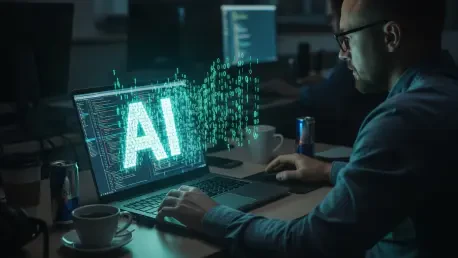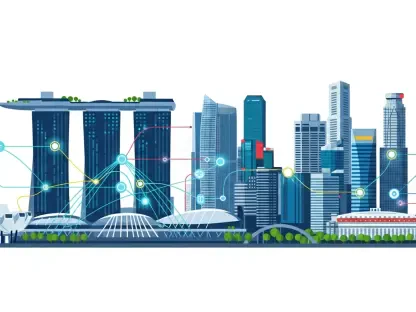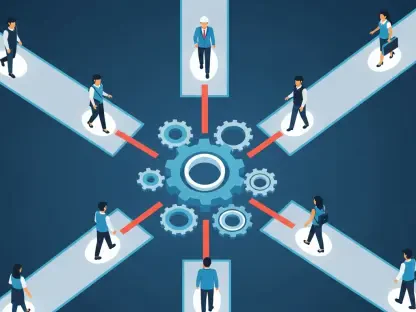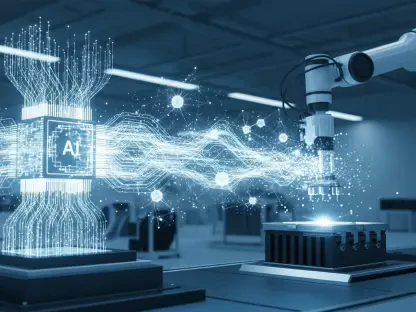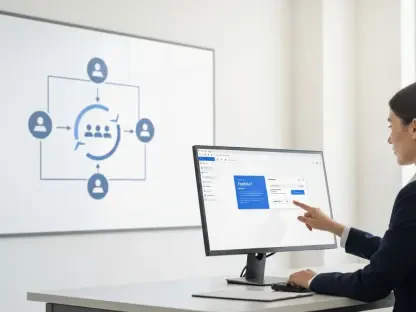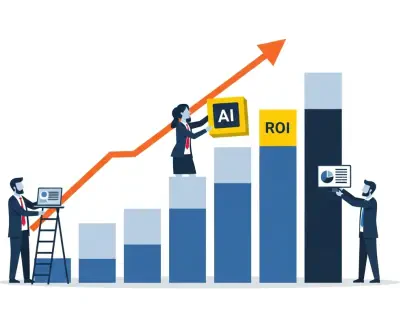The Current Landscape of Software Engineering and AI Integration
In an era where technology evolves at breakneck speed, software engineering stands as the backbone of innovation, powering everything from mobile apps to critical infrastructure systems, while employing millions globally. The industry drives advancements in sectors like healthcare, finance, and entertainment, with a constant demand for skilled professionals to design, develop, and maintain complex systems. Yet, a new player has entered the field—artificial intelligence (AI)—raising questions about the future of human roles in this vital domain. Tools powered by AI are already transforming how code is written and tested, prompting both excitement and concern among industry stakeholders.
The rise of AI technologies, such as GitHub Copilot for code generation and automated testing platforms, marks a significant shift in development workflows. These tools can produce functional code snippets, identify bugs, and streamline repetitive processes, integrating seamlessly into the toolkits of many developers. Major tech giants like Microsoft and Google, alongside innovative startups, are heavily investing in AI to enhance productivity, with adoption rates climbing across the board. This trend underscores a broader movement toward automation in software creation, reshaping traditional practices.
Amidst this technological surge, speculation about job displacement looms large, making the intersection of AI and software engineering a critical topic for discussion. The fear of machines fully replacing human engineers often overshadows the potential for collaboration, creating a polarized narrative in tech communities. Understanding the scope of AI’s influence—its capabilities, limitations, and the industry’s response—is essential to navigating the evolving landscape and preparing for what lies ahead.
AI’s Role in Software Development: Trends and Data
Emerging Trends in AI and Software Engineering
One of the most prominent trends in the industry is AI-driven automation of mundane tasks that once consumed significant developer time. Activities like writing boilerplate code, debugging syntax errors, and generating documentation are increasingly handled by algorithms, allowing engineers to focus on more intricate challenges. This shift not only accelerates project timelines but also reduces human error in routine operations, marking a pivotal change in daily workflows.
Beyond automation, AI is emerging as a collaborative partner rather than a standalone replacement for human effort. Tools are designed to assist with suggestions and optimizations, enabling developers to refine their ideas with greater efficiency while retaining control over critical decisions. This partnership model fosters an environment where technology amplifies human creativity, particularly in areas like rapid prototyping and iterative design, pushing the boundaries of innovation.
Additionally, the expectations for software engineers are evolving, with new roles such as AI system trainers and automation specialists gaining traction. These positions focus on managing and fine-tuning AI tools, ensuring their outputs align with project goals. Such opportunities highlight how AI is not just reshaping tasks but also creating fresh career paths, encouraging professionals to adapt to a hybrid skill set that blends traditional coding with machine learning expertise.
Key Data and Growth Projections
Data from the U.S. Bureau of Labor Statistics projects a robust 15% increase in software engineering jobs from the current year to 2034, translating to approximately 288,000 new positions. This growth reflects a sustained demand for talent despite the rise of automation, driven by expanding digital transformation across industries. The median salary for these roles, hovering around $131,450, further signals the profession’s resilience and economic value in a tech-centric world.
Productivity metrics provide additional insight into AI’s impact, with tools like GitHub Copilot enabling developers to complete tasks 55% faster, according to recent studies. Moreover, the Stack Overflow Developer Survey indicates that 52% of developers report enhanced efficiency when using AI assistance, showcasing widespread acceptance of these technologies. Such figures suggest that rather than diminishing roles, AI is becoming a catalyst for faster, smarter work processes.
Looking ahead, forecasts point to deeper AI adoption in software development, with an emphasis on stability and augmentation rather than replacement. Industry analysts predict that by the end of this decade, most development environments will integrate AI tools as standard, supporting smaller, more agile teams. This trajectory indicates a future where job growth continues alongside technological advancement, balancing automation with the irreplaceable human touch.
Challenges and Limitations of AI in Software Engineering
Despite its promise, AI in software development faces significant hurdles, particularly in contextual understanding and handling complex tasks. Current systems often struggle with ambiguous requirements or domain-specific nuances, leading to errors or “hallucinations”—outputs that seem correct but are fundamentally flawed. These limitations highlight the technology’s inability to fully grasp the subtleties of human intent or intricate project goals without guidance.
The necessity of human oversight remains paramount, often described as a “human-in-the-loop” approach, to ensure reliability and accuracy. Engineers must review AI-generated code, validate its logic, and adapt it to specific needs, especially in high-stakes applications like medical or financial systems. This dynamic underscores that while AI can assist, it cannot independently shoulder the responsibility for critical outcomes, reinforcing the enduring need for skilled professionals.
Further challenges include the risk of over-reliance on AI tools, which could lead to skill erosion among developers if fundamental coding abilities are neglected. To counter this, strategies such as continuous learning and a strong emphasis on technical basics are recommended. By maintaining a balance between leveraging automation and honing core competencies, engineers can mitigate potential downsides and ensure they remain indispensable in a rapidly changing field.
Ethical and Regulatory Considerations in AI Adoption
As AI becomes more embedded in software development, the regulatory landscape surrounding its use grows increasingly complex, with a focus on data privacy and security standards. Governments and industry bodies are crafting guidelines to protect sensitive information processed by AI tools, ensuring compliance with laws like GDPR in Europe or CCPA in California. These frameworks aim to safeguard both developers and end-users from unintended breaches or misuse.
Ethical concerns also surface, particularly around bias in AI-generated code and accountability for errors in critical systems. If an algorithm produces flawed outputs due to biased training data, determining responsibility becomes a murky issue, especially in sectors where mistakes carry severe consequences. Addressing these dilemmas requires transparent practices and robust mechanisms to trace and rectify AI decisions, fostering trust in automated solutions.
Compliance with industry standards is vital for responsible AI adoption, shaping how tools are integrated into development pipelines. Organizations must prioritize ethical guidelines, ensuring that automation does not compromise quality or fairness. As regulations evolve, they are likely to influence the pace and manner of AI implementation, encouraging a cautious yet progressive approach to balancing innovation with accountability.
Future Outlook: AI and Software Engineering Collaboration
Envisioning the path ahead, the synergy between AI and software engineers points toward a collaborative future where smaller, cross-functional teams drive innovation with heightened efficiency. AI tools are expected to handle routine workloads, freeing professionals to tackle strategic initiatives and creative problem-solving. This model promises to streamline operations, enabling companies to deliver solutions faster while maintaining high standards.
Emerging technologies, including advanced AI models and low-code platforms, stand poised to further disrupt traditional development paradigms. These advancements could simplify complex processes, making software creation more accessible while still requiring human expertise for customization and oversight. Keeping pace with such disruptors will be crucial for organizations aiming to stay competitive in a dynamic market.
The skill set for engineers is also transforming, blending deep technical knowledge with interpersonal abilities and AI-native proficiencies like prompt engineering. Adapting to global economic shifts, rapid technological progress, and changing consumer demands will shape the industry’s trajectory, pushing professionals to remain versatile. This evolving landscape suggests a future where adaptability and collaboration with AI define success in software engineering.
Closing Thoughts
Reflecting on the insights gathered, it becomes evident that AI serves as a powerful augmentative force rather than a threat to software engineers. The analysis reveals sustained job growth, significant productivity gains, and a clear delineation of AI’s limitations, which cement the enduring value of human expertise. Discussions around ethical and regulatory frameworks further highlight the importance of responsible integration during this transformative period.
Looking back, the collaboration between AI and human developers emerges as a cornerstone for innovation, with data pointing to a balanced coexistence that enhances industry capabilities. Moving forward, actionable steps include a strong focus on upskilling, with engineers encouraged to master AI tools while preserving core technical and problem-solving skills. Additionally, organizations need to invest in training and establish robust oversight mechanisms to ensure quality and accountability.
Beyond these measures, future considerations involve fostering a culture of continuous adaptation, where both individuals and companies remain agile in response to technological shifts. Emphasizing ethical AI practices and staying aligned with evolving regulations offers a pathway to sustainable progress. These strategies promise to harness AI’s potential, ensuring that software engineering thrives as a field of human ingenuity and technological synergy.
